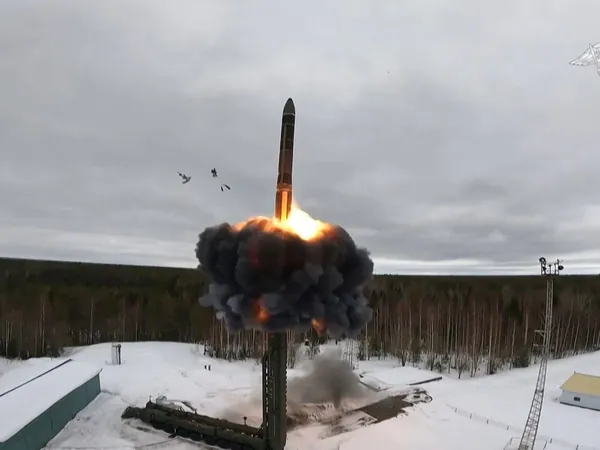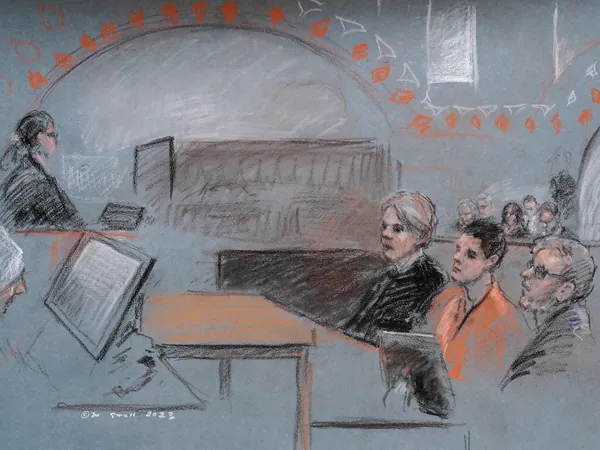
Tensions Escalate as Russia Tests New Missile Capabilities, Targets Ukraine
2024-11-21
Author: Liam
Introduction
In a bold declaration during a nationwide address on Thursday, Russian President Vladimir Putin announced the successful test of a new intermediate-range missile, reportedly striking Ukraine in retaliation for recent Ukrainian strikes within Russian territory. This statement comes at a time when tensions between the two nations are at an all-time high, following escalations in missile deployments and military strategies.
Putin's Threats and Missile Strike
Putin emphasized that Russia would not hesitate to use this newly tested missile against nations that have provided military support to Ukraine. In a warning that rattled observers, he stated, “Our advanced capabilities could aim at anyone who facilitates Ukraine’s missile strikes on Russian soil.”
The missile strike on Ukraine was perceived as a significant escalation, particularly in light of Ukrainian forces firing long-range missiles supplied by the U.S. and the U.K. earlier in the week. An initial analysis from American officials suggested that the missile utilized in the attack on Dnipro was indeed an intermediate-range ballistic missile, contradicting Ukrainian claims that an intercontinental missile was involved. The aftermath of the strike saw two individuals injured and damage inflicted on local infrastructure, including an industrial facility and a rehabilitation center.
Western Response and Escalation
Adding to the chaos, earlier this week, Western nations, led by the Biden administration, relaxed restrictions on Ukraine’s use of U.S.-made long-range missiles, allowing them to target deeper within Russian territory. This decision provoked an immediate response from Moscow, indicating that geopolitical tensions were on the brink of a major shift. Shortly thereafter, reports indicated that Ukraine had launched several strikes into Russian territory.
Nuclear Doctrine and Global Concerns
Compounding these tensions, Putin recently signed a controversial military doctrine that lowers the threshold for a nuclear response, underpinned by fears of perceived aggression from NATO and Western allies. This move has raised alarms among international observers, as analysts note that such rhetoric may be an attempt by Russia to intimidate Ukraine and its supporters. A spokesperson for NATO condemned Russia’s military escalation, calling it a “grave concern,” and urged for diplomatic resolutions instead of military provocations.
Civilian Impact and Future Implications
As the situation deepens, civilian suffering continues to rise. The latest reports indicate that another strike targeted Kryvyi Rih, President Zelenskyy’s hometown, injuring 26 civilians and damaging multiple residential buildings and administrative offices.
Experts suggest that although the enhanced capabilities of Ukraine’s missile strikes may not immediately alter the dynamics of the ongoing war, they complicate Russian logistics and contribute to a heightened state of vulnerability for their forces. As both sides ramp up military efforts, the conflict appears poised to reach new, dangerous heights—raising the stakes and implications for the broader European security landscape.
Conclusion
With geopolitical tensions intensifying and military provocations on both sides, the world watches anxiously, as the conflict threatens not just regional stability but global peace as well. Buckle up, as this story is far from over!









 Brasil (PT)
Brasil (PT)
 Canada (EN)
Canada (EN)
 Chile (ES)
Chile (ES)
 España (ES)
España (ES)
 France (FR)
France (FR)
 Hong Kong (EN)
Hong Kong (EN)
 Italia (IT)
Italia (IT)
 日本 (JA)
日本 (JA)
 Magyarország (HU)
Magyarország (HU)
 Norge (NO)
Norge (NO)
 Polska (PL)
Polska (PL)
 Schweiz (DE)
Schweiz (DE)
 Singapore (EN)
Singapore (EN)
 Sverige (SV)
Sverige (SV)
 Suomi (FI)
Suomi (FI)
 Türkiye (TR)
Türkiye (TR)